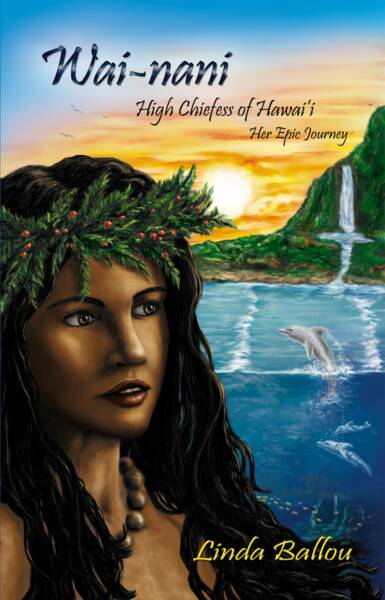Any historical fiction lovers out there? Which titles do you feel qualify as great, balanced historical fiction?
I very much admire authors like Linda Ballou who choose to write historical fiction. It’s such a tricky genre, constantly treading the line of creative liberty and historical fact. While I appreciate how her numerous travels inspire her to write, and that she was so touched with ancient Hawaiian culture, I have to admit I’ve struggled with reviewing Wai Nani for some time now. Linda is such an enthusiastic author and marketer of her books I couldn’t deny a guest review (check out my counter-review and comments at the end).
Wai-nani: High Chiefess of Hawai’i
A guest review by Barbara Sharp Milbourn
Barbara is a writer and editor living in Nashville.
 Travel writer and photographer Linda Ballou delivers a generous slice of Hawaiian history with details of land and sea so vivid, it is almost better than being there.
Travel writer and photographer Linda Ballou delivers a generous slice of Hawaiian history with details of land and sea so vivid, it is almost better than being there.
Wai-nani: Voice from Ancient Hawaii is a meticulously researched account of the Hawaiian Islands around the time of Captain James Cook. The major theme of the novel is the dismantling of the social hierarchal system based on kapu (taboo) that had been brought to the Islands by the Tahitians years before. But what a story!
Meet Wai-nani whose character is based on Ka’ahumanu, favorite wife of Kamehameha the Great, unifier of the Hawaiian Islands around 1810. She is a young woman of royal descent so at home in the sea that she thinks of herself as half sea creature. Her comfort in the water is juxtaposed to her conflict on land, particularly her resistance to the kapu system. We accompany her as she leaves home and meets Makaha (Kamehameha) two hundred years ago when chiefs in feathered capes and tattooed warriors battled for island dominion, priests read the future in pig entrails, men and women ate in separate houses, and human sacrifices were commonplace. We know her and her people, and we connect to place through stunning details of mamo birds, koa trees, ‘ie’ie flowers, and taro fields. We drink the bitter ‘awa, trek up steep palis, peer into smoking volcanoes, and wave slide bearded monsters.
Much changed with the arrival of Captain Cook, the death of Kamehameha, and the pressure brought to bear on the system. But some things are eternal—love, the circle of life, and the grand and vibrant sea.
The author’s reverence for the land and its people inhabits her words. Linda Ballou is a new voice from ancient Hawaii.
___________________
To say that Linda did extensive research for this book would be an understatement. You can tell she put in great effort to make Wai Nani culturally reflective. Maybe too much. It’s like when you’ve just learned a list of new vocabulary words and crammed them all into a paragraph. It’s great that you know and use them but not necessarily the best or most natural reading/narrative. The story, although excellent in setting, was lacking in subtlety. I felt like I was repeatedly being hit over the head with things to make me sympathize with Wai Nani. We see Wai Nani rebelling and then she tells us she’s rebelling. Then she reflects on how guilty she feels for rebelling, and then she gets her dolphin friends to help her rebel some more, against the SO oppressive kapu system that basically kept people working the land with great harvests and a structured society for hundreds of years, but we have no real idea why.
Also the switching between third and first person now and then was confusing… it seemed Wai Nani could read all manner of people’s (and animals’) minds and feelings.
Linda does wonders in describing the land and the sea—how the people were tied to it, how important it was to their lives and spirits. However, the overly sensualized dolphin encounters were a bit over the top for me… Wai Nani feels at one with the sea, I get it. I appreciate that the author didn’t hold back in depicting how open the Hawaiians were with their sexuality but some of the scenes were so romanticised it was borderline saccharine. The problem I had with this book—other than its basis on Kaahumanu as some kind of feminist liberator with mystical connections to the sea, land and gods— is that the story would be going well and then it would just warp into “too much everything”.
Initially after reading this book I was ready to write a full length academic essay on historical fiction and cultural representation. I really struggled with it because ultimately I’m glad that people are writing fiction about Hawaii and its people, and I know that even if the book is not to my taste, someone will enjoy it and it will inspire them, and hopefully get them interested in reading more about our islands.
I both agree and disagree with the guest review.”The author’s reverence for the land and its people” DOES inhabit her words, and she certainly succeeds in painting a beautiful picture while showcasing the very spiritual, nature-loving side of the Hawaiian people. But as the reviewer says “Linda Ballou is a new voice from ancient Hawaii”, well, that’s a big statement that scares me a little bit a lot.
Visit Linda’s author page and read more about her books and adventures. You can also purchase the book and read sample excerpts. Thank you to Linda for kindly sending us a copy and for graciously reminding us to review the book. We wish you many more great adventures and successful stories. Thank you to Barbara for her guest review.




